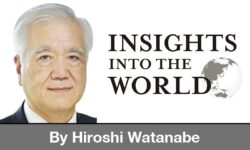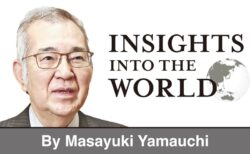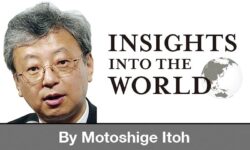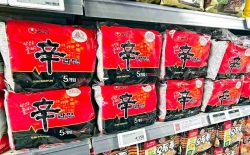11:52 JST, May 20, 2022
“Russians are a nation that exists only to give great lessons to the world rather than being part of all human beings,” wrote Russian thinker Peter Chaadayev (1794-1856) in his “Philosophical Letters.” He described Russia as a great land separating Asia and Europe with one elbow on China and the other on Germany to support itself. He wanted Russians to develop intelligence and imagination among themselves, tasking them with a mission to unite the history of the entire globe in Russian civilization.
However, Peter the Great and Catherine the Great, both of whom Russian President Vladimir Putin admires, did nothing to make the obligation to respect freedom and diversity — the essence of civilization — take root in Russia. For his part, Putin seems to boast of Russia as a Eurasian polity that gives valuable lessons to the world by virtue of not only being part of neither Asia nor Europe, but also by transcending the differences between them.
The 19th-century philosopher’s belief in his lessons reflected his well-meaning intention that the fact Russia had lagged behind Europe in appearing in history was an advantage for the Russians, in that they would not repeat the blunders Europeans had earlier committed. On the contrary, Putin, asserting Russia’s strength in its multinational and multiethnic character, clings to the mantle of Eurasianism, while showing no hesitation for brutal aggression to resurrect a great Russia as a reunited state, which ceased to exist in the wake of the demise of the Romanov dynasty and the end of the Soviet Union.
The areas subject to the restoration Putin has in his mind include Kyiv, which used to be the heart of Rus, the premodern polity that eventually became Russia. In other words, his ambition also covers Ukraine. He insists that he has been assigned a mission to have Ukraine merge into the great Slavic federation, namely a great Russian state, together with Belarus, which literally means “White Russia.” As a politician, Putin takes it for granted that he is immune to any responsibility for explaining the justification or illegality of Russia’s “military actions” against Ukraine. He also thinks it is enough just to use Russia’s veto power as a permanent member of the U.N. Security Council. In recent months, defining itself as a unique Eurasian state that goes beyond the Asian-European boundary, Russia has been attempting to realize Putin’s sense of mission, based on the standpoint of a civilized mission by military means.
4 transformative events
Since the start of the 20th century, Russia has experienced four major events that transformed global history. First, from 1904 to 1917, Russia’s defeat in the Russo-Japanese War and the Russian Revolution resulted in the dissolution of the Romanov dynasty. It then became the first socialist state in the world.
Second, the Soviet Union fought against Germany during World War II. The Soviet leadership utilized the rationale behind the Great Patriotic War as leverage for bringing postwar Eastern Europe under its influence and hiding the inhumane character of Joseph Stalin’s regime.
Third, from 1989, when the Cold War ended, to 1991, when the Soviet Union collapsed, the great Russian state was disintegrated, and those developments turned out be historically significant. It opened the way for the introduction of civil freedom and the establishment of nationally independent republics. To put it in Chaadayev’s style, these three sets of historical events can be said to have given both positive and negative “lessons” to the history of the world.
However, it is difficult to find a positive legacy for history from the latest fourth event. Russia demands the “denazification” of Ukraine in an apparent analogy to the Great Patriotic War the Soviet Union waged against Germany. But it is Ukraine, not Russia, that is now fighting a patriotic war. Moreover, just like Stalin, who underestimated the strength of Finnish troops and ordered Soviet troops in 1939 to invade Finland to start the Winter War only to encounter an uphill fight, Putin’s invasion of Ukraine continues to face fierce resistance from the neighboring country.
As I see Russian troops invading Ukraine, I am reminded of ancient Chinese historian Sima Qian’s words that “death may be as light as a goose feather.” The situation stems from how Putin actually views the Russian people. In his notion, he is not a subject of the Russian people; they are his subjects. The Russian leader believes Russians are obliged to protect Mother Russia — namely Putin — while Mother Russia — namely Putin — does not necessarily protect the Russian people. Therefore, he does not mind if soldiers die in action.
Whereas in Japan and the United States, their states exist to defend their respective peoples’ personal freedoms and rights, in Russia, individuals, with just a few exceptions, and society itself have been inferior to the state and dictators in terms of importance since the Stalin era. Those who are given importance are members of the social elite in Russia who wield great influence upon the state structure and apparatus. They are “state people” belonging to the Federal Security Service or the FSB, as well as the Interior Ministry and the Defense Ministry to support ex-KGB officer Putin, write Fiona Hill and Clifford G. Gaddy in “Mr. Putin: Operative in the Kremlin,” published by the Brookings Institution Press.
Russians who, like Putin, started their careers in these “force-wielding” ministries or agencies are commonly known as siloviki. They proudly regard themselves as the best patriots and last guardians of Russian statehood. Nevertheless, like termites, those in the siloviki circles, including Putin, have been causing the Russian state to get rotten from the core. Food and ammunition supplies for Russian troops fighting in Ukraine have been so low that many soldiers have reportedly surrendered or deserted. The Russian president, who has allegedly amassed hidden assets worth up to an estimated $200 billion, is to blame for the debacle.
When compared with the fact that leaders in the Russian military and secret police personally amass hundreds of millions or even trillions of rubles by embezzling state wealth and abusing public interests, the fortune accumulated by the Byzantine Empire now looks modest. In the sixth century, comptrollers of the empire pocketed salaries paid to those who had been killed in action or discharged by retaining their names on the military register.
Corruption-riddled force
According to Byzantine historian Procopius, the author of “Secret History,” those comptrollers believed that it was an act of justice to commit fraud to pay tributes to Emperor Justinian. However, with the actual number of soldiers decreasing, the empire’s armed forces continued to be understaffed while soldiers and officers in active service were unable to be promoted because the relevant posts remained filled by the fallen soldiers and officers.
In the Russian military of today, which is riddled with corruption on a much larger scale, Gen. Valery Gerasimov, Russia’s highest ranking uniformed officer as chief of the general staff, was reported to have narrowly escaped death while on a recent visit to Russian-controlled areas in Ukraine, while more than 10 generals have reportedly been killed in action. Their presence on the fronts in Ukraine indicates that Russian troops remain reluctant to fight in the war. If Putin has had Syrian and Chechen Muslims recruited to be deployed to Ukraine as reinforcements, he is paving the way further toward “a war without a rationale” by breaking with the Russian Orthodox Church and the Russian national character that hold the Russian state together.
Unjust rule by “only one person” pursuing power and benefits just for himself cannot be for the common good of his subjects. Putin is a politician called a present-day dictator who would have been called a tyrant in ancient times. Medieval Scholastic philosopher Thomas Aquinas wrote in his book “On the Governance of Rulers” that tyrants kill people on a whim, not for the sake of justice, and harbor suspicions against good people instead of bad ones, as they are afraid of virtue.
To date, even in the event of a threat to use tactical nuclear weapons from a tyrant, who is beyond anyone’s control, the world has not experienced an escalation of nuclear threats. To prevent Putin from resorting to the use of ultimate force, there can be three possible approaches.
First, a great majority of Russians should see into the essence of Putin to the extent that they will pull him down from his seat of power. Second, multiple members of the staff in Russia authorized to use the nuclear launch codes should pluck up their courage to inhibit Putin from using nuclear weapons capriciously. Third, the West and Japan should show Russia the red line it must not cross.
We have only a little time left for multifaceted discussions about the dangerous chances of the conflict in Ukraine escalating into World War III and the possibility of averting the worst outcome. That said, we should still never allow Putin alone to freely make nuclear threats. Chaadayev’s “lesson” is being revived in a prophetic way more than two centuries after he gave it in the 19th century.
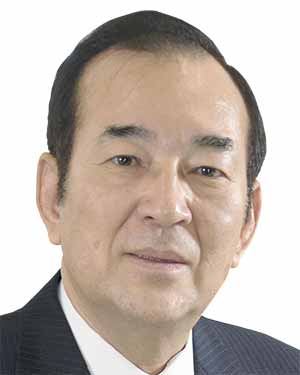
Masayuki Yamauchi
Yamauchi is a professor at Musashino University and a professor emeritus at the University of Tokyo, where he previously headed the University of Tokyo Center for Middle Eastern Studies (UTCMES).
Top Articles in Editorial & Columns
-

40 Million Foreign Visitors to Japan: Urgent Measures Should Be Implemented to Tackle Overtourism
-

University of Tokyo Professor Arrested: Serious Lack of Ethical Sense, Failure of Institutional Governance
-

Policy Measures on Foreign Nationals: How Should Stricter Regulations and Coexistence Be Balanced?
-

China Provoked Takaichi into Risky Move of Dissolving House of Representatives, But It’s a Gamble She Just Might Win
-
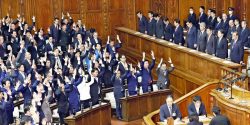
PM Takaichi Should Help Young Japanese Break Seniority Barrier to Vitalize Politics
JN ACCESS RANKING
-

Japan Institute to Use Domestic Commercial Optical Lattice Clock to Set Japan Standard Time
-

Israeli Ambassador to Japan Speaks about Japan’s Role in the Reconstruction of Gaza
-

Man Infected with Measles May Have Come in Contact with Many People in Tokyo, Went to Store, Restaurant Around When Symptoms Emerged
-

China Eyes Rare Earth Foothold in Malaysia to Maintain Dominance, Counter Japan, U.S.
-

Prudential Life Insurance Plans to Fully Compensate for Damages Caused by Fraudulent Actions Without Waiting for Third-Party Committee Review


